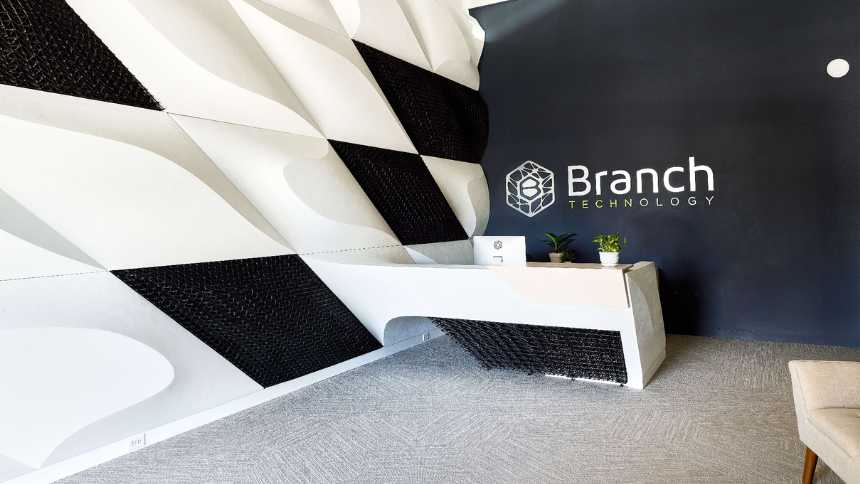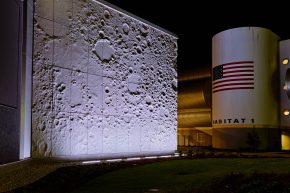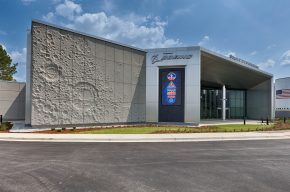
Branch Technology has a new CEO
Founder Platt Boyd is now the Chief Innovation Architect for the Chattanooga-based robotic 3D printing company.
Nine years after founding Branch Technology Inc. and moving it to Chattanooga, Platt Boyd turned over the day-to-day leadership of the robotic 3D printing company to Ryan Lusk, another industry veteran, and assumed the title of Chief Innovation Architect in April. In his new role, Boyd is leading the company’s innovation, new product ideation, and strategic partnerships while also serving on the Board of Directors.
We first spotlighted Branch Technology about a year after its founding when Boyd took the start-up through The Company Lab’s “GIGTANK” accelerator (see July 2015 teknovation.biz article here). Later, we continued to periodically write about the company, but we had not done so since its move from the Hamilton County Business Development Center to much larger space on Riverside Drive.
We recently had the opportunity to tour the new digs and also interview Lusk, an industrial and systems engineer who, like Boyd, is an alum of Auburn University although their time on the Plains did not overlap. Lusk later earned an MBA from The Fuqua School of Business at Duke University.
He moved to Chattanooga in 2012 to serve as Chief Financial Officer and Chief Operating Officer of Jackson Furniture Industries, a family-owned furniture manufacturer based in Cleveland, TN with 11 manufacturing plants and 2,000 employees across the southeastern U.S. He helped scale it from $100 million to $500 million in sales.
“I was attracted to Branch because of its culture of leading with values,” Lusk told us. Now, as Chief Executive Officer who is focused on long-term growth, he says the question of product-market fit is top of mind.
“It is both the blessing and a curse of our technology,” Lusk says, explaining, “You can do anything with it.”
The technology is inspired by nature’s efficiencies in creating cellular structures, something that Branch Technology terms cellular fabrication or C-Fab®. It is a construction-scale, freeform 3D-printing technique and direct digital manufacturing approach that is a first-in-the-world application.

The company currently offers three products:
- BranchCladTM which is mass-customized, ventilated rainscreen systems and bespoke building skins;
- StoPanel® 3DP, described as the ultimate panel customization with speedy installation, value and superior performance; and
- BranchMatrixTM, a 3D-printed open lattice material that can take on virtually any shape or form.
For Lusk, a key decision going forward is pricing which he says is clearly part of how a company like Branch Technology addresses product-market fit.
Because there are long sales cycles for the company, another challenge is to determine how best to even out that reality, so that Branch Technology does not have so many highs and lows. Lusk has found a solution in his old industry which is using the core technology to make frames for sofas. 3D-printing a frame can take as much as 50 pounds out of a frame while also capitalizing on the low periods when the labor force and equipment might otherwise be idle.

The company also has developed very small (like eight foot by eight foot) temporary shelters to house otherwise homeless people. While the single occupant structures do not have plumbing, they are secure, insulated and provide a societal good.
Branch Technology will add three business lines – consumer products, the shelters, and façade retrofitting which is probably the most mature. A patent for that technology has been filed, and Lusk says that doing energy efficiency retrofits “could be the most attractive and highest growth potential” of all areas.
To illustrate that point, he notes a recent $1.13 million Direct-to-Phase II Small Business Innovation Research award from AFWERX, the innovation arm of the U.S. Air Force, to develop a 3D printed, highly insulating building retrofit system for exterior walls that reduces installation maintenance, improves operational environmental sustainability, and increases physical building resilience.
“We could experience 500 to 800 percent growth in the next year to 15 months,” Lusk says.
Like what you've read?
Forward to a friend!

